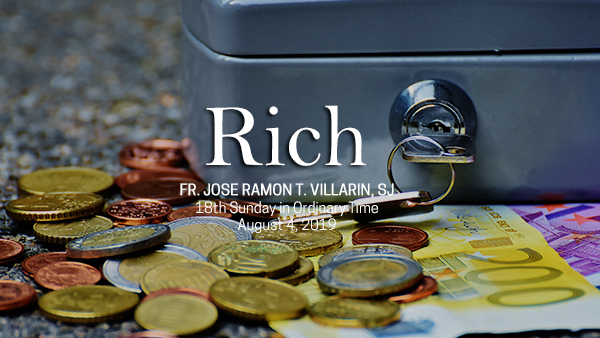


Fr. Jose Ramon T. Villarin, SJ
18th Sunday in Ordinary Time
August 4, 2019
In the eyes of the world, one becomes rich by getting. In the eyes of God, one gets rich by giving.
The question then of our life’s richness depends on whose eye matters to us more: the world’s or God’s?
If God does not matter to us, we will not believe in “eternalities,” that is, in things that last, and life as we know it will be the only ride in town. That being the case, we will stuff our seat with all that we can get because when the ride is over, well, the game is over.
On the other hand, if God’s sight matters to us, we will not readily repose our life in ephemera, that is, in things that are passing, and life as we know it is just the beginning of a very long journey. If life is so, we will be more careful about what we pack with our belongings because not all of these may be needed for the journey.
We never really worry about destination or destiny until the fourth quarter of our lives. In the eyes of heaven, this is short-sighted and sad because life (as God has meant it) is not so quartered. Our destiny (i.e. our future) is always worth remembering because it is destiny that directs what we bring into our lives. If our destiny is to live with God forever, we will take care to carry with us the things that are not perishable. If we think otherwise of our destiny, we will hoard what we can hoard and be wracked with anxiety.
When the rich man in today’s Gospel ponders how many more barns he can build to store all his riches so that he can “rest, eat, drink, [and] be merry,” God asks him bluntly, “You fool, this night your life will be demanded of you; and the things you have prepared, to whom will they belong?”
The Lord then winds up the story with a scathing judgment, “Thus will it be for all who store up treasure for themselves but are not rich in what matters to God.”
It helps to ask where this drive to hoard things for ourselves can come from. One source is plain and simple selfishness. Sometimes this selfishness is subtly masked by a perverse and self-made sense of entitlement. “This hoard of mine is what I’ve earned and worked hard for, whether you think otherwise or not, thank you.”
Another source of avarice is anxiety, which is tied to our view of the future. It is the future’s uncertainty and insecurity that can drive us to store things now to spare us the risks of tomorrow. Regarding tomorrow, for instance, the spread in interest rates is just a proxy for anxiety. Of the many unknowns driving our anxiety, the darkest of them all is death. In the face of this and other uncertainties, we latch on to the safety of our possessions.
To be clear, the Lord is not really asking us to lead dispossessed and destitute lives. He is just alerting us to take care that our possessions do not possess us. If we are honest, our possessions do have that diabolical power to make us forget who we are, our destiny, and what makes for enduring happiness in this journey of life that has just begun.
What makes for true happiness will not be found in getting but in giving. In a word, sharing. And what helps us ultimately to share is trust, which we learn from the graciousness of faith.
It is faith that opens us to the liberating trust that we are sheltered and loved dearly by God. It is faith that leads us to lean on community where we learn to share stories, possessions, and even the risks and anxieties of an unknown future. It is faith that enables us to entrust our lives back to God who shares our burdens and offers his very life to us.
Vanity of vanities, the writer of Ecclesiastes exclaims to us in the first reading today. Vain can mean excessive and obsessive love of one’s own. It can also mean futile or worthless, even hopeless. Both senses of this word of warning are telling.
Let our efforts to be rich then in what matters to God be not in vain.